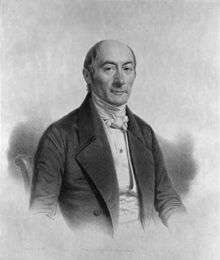Georg Friedrich Puchta
Georg Friedrich Puchta (31 August 1798 – 8 January 1846) was a German jurist.

Biography
Born at Kadolzburg in Bavaria, he came of an old Bohemian Protestant family which had immigrated into Germany to avoid religious persecution. His father, Wolfgang Heinrich Puchta (1769–1845), a legal writer and district judge, imbued his son with legal conceptions and principles. From 1811 to 1816 young Puchta attended the gymnasium at Nuremberg, where he acquired a taste for Hegelianism. In 1816 he went to the university of Erlangen, where, in addition to being initiated by his father into legal practice, he fell under the influence of the writings of Savigny and Niebuhr. At this time the famous Christian Friedrich von Glück taught at the university of Erlangen. Puchta said about the faculty of Erlangen: "Jede Universität ist freilich mit einem Pfahl im Fleisch geplagt, aber die hiesige Fakultät hat, wenn Glück stirbt, nichts als Pfähle".[1] (Translation "Every university certainly is plagued with a thorn in the flesh, but the faculty here, when Glück dies, will have nothing but thorns.") Taking his doctor's degree at Erlangen, he established himself there in 1820 as a Privatdozent.
In 1828 he was appointed ordinary professor of Roman law at Munich. In 1835 he was appointed to the chair of Roman and ecclesiastical law at Marburg, but he left this for Leipzig in 1837, and in 1842 he succeeded Savigny at Berlin. In 1845 Puchta was made a member of the council of state (German: Staatsrat) and of the legislative commission (German: Gesetzgebungskommission). He died at Berlin in 1846.
Works
His chief merit as a jurist lay in breaking with past unscientific methods in the teaching of Roman law and in making its spirit intelligible to students.
Among his writings must be especially mentioned Lehrbuch der Pandekten (Leipzig, 1838, and many later editions), in which he elucidated the dogmatic essence of Roman law in a manner never before attempted; and the Kursus der Institutionen (Leipzig, 1841–1847, and later editions), which gives a clear picture of the organic development of law among the Romans. Among his other writings are Das Gewohnheitsrecht (Erlangen, 1828–1837) and Einleitung in das Recht der Kirche (Leipzig, 1840).
Kleine civilistische Schriften (1851), edited by Adolph August Friedrich Rudorff, is a collection of essays on various branches of Roman law, and the preface contains a sympathetic biographical sketch of the jurist.
Bibliography
References
- Alessandro Hirata, Die Vollendung des usus modernus pandectarum: Christian Friedrich von Glück (1755-1831), Savigny Zeitschrift 123 (2006), 333 n. 12.

- Tuisco Ziller, Ueber die von Puchta der Darstellung des römischen Rechts zu Grunde gelegten rechtsphilosophischen Ansichten (1853)
- Gabor Hamza, "Entstehung und Entwicklung der modernen Privatrechtsordnungen und die römischrechtliche Tradition", Budapest, 2009, pp. 192-195.
External links
- Vorlesungen über das heutige römische Recht (full text) (in German)